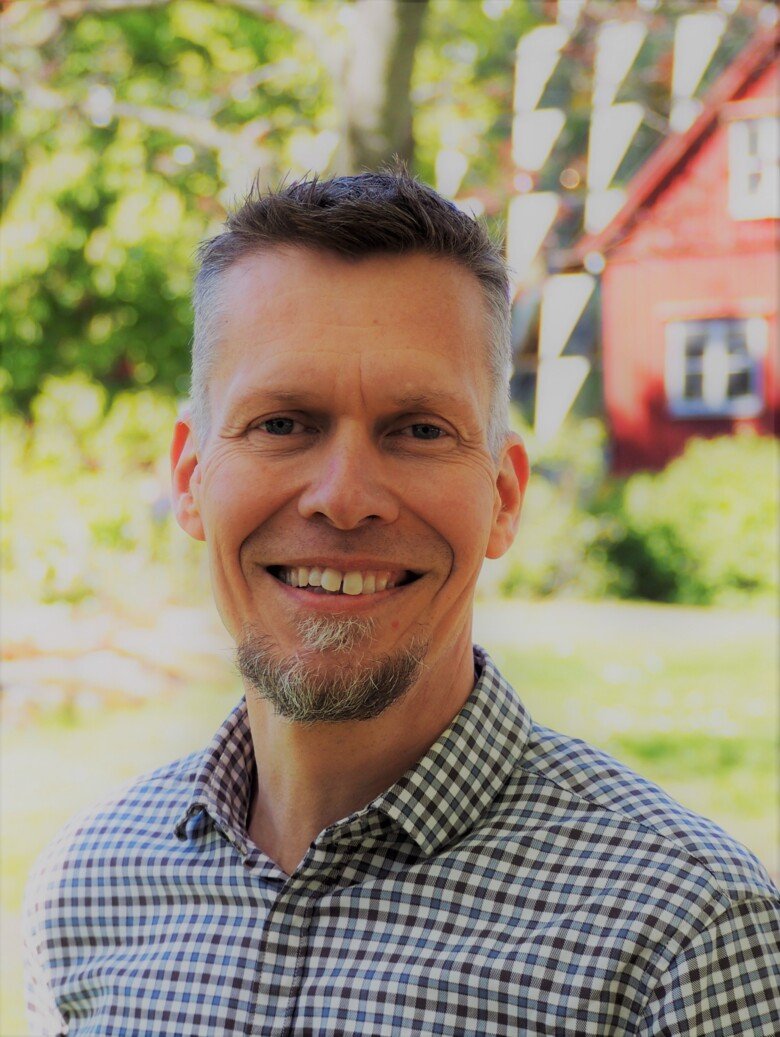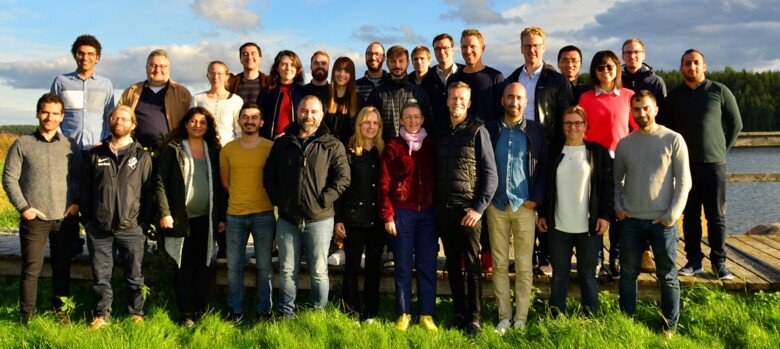”Why are people dying of cancer when we know so much of this disease?”
Our last virtual interview of 2020 is with Janne Lehtiö, Professor in clinical proteomics at the Department of Oncology and Pathology as well as Scientific Director of SciLifeLab. We discuss the importance of being a curiosity driven scientist, a team-oriented PI where the emphasis is placed on the people of the team itself and not simply your own win.

Janne Lehtiö comes from a chemistry and engineering background and has always been interested in nature and biology. When he moved into his PhD he started studying one protein domain (carbohydrate binding domain), and did everything on that protein from site directed mutagenesis, to producing it, to analysing it in different ways. He describes thinking that he was “the world leading expert of that single protein domain” and was missing the bigger picture. Soon after the completion of his PhD he went into an American biotech company with the thinking that the grass (might) look greener on the other side. “I wanted to broaden the scope so I started to work on proteomics and biological systems in industry.” However, he decided to return to academia after having learned some valuable lessons, as he outlines “it is easier for me now to collaborate with companies as I understand their priorities. Also the company period taught me that the human assets and the team are the most important thing- which is something that is often missed in academia. But then I also learned that a lot of decisions were being made based on short-term revenue quests, rather than a long-term quest for discovering new things. I wanted to work more curiosity driven and within biomedical research. I wanted to work on something that feels meaningful and provides a never-ending challenge; that to me is the improvement of cancer care. I now get to work on what I am passionate about.”
What is your WHY?
“Why are people dying of cancer when we know so much of this disease? Like everyone else, we as cancer researchers have also our fair share of personal cases of family and/or friends suffering and dying from cancer. Making one realize that we are missing the system level picture, that is key to unlocking combinatory treatments. So my new keen interest is to develop proteomics towards clinical use and learn during that process how can systems biology data help individual patients. How can we improve the circle of information from research to clinic and back? Aside from the proteome-driven systems biology, we are now spending a lot of time figuring out concrete patient centric findings as well as utilising outcome data to improve omics data interpretation."
What are you excited about today?
“I’m excited about our current cancer proteomics projects in lung cancer and leukaemias. This is the first time we can analyse hundreds of patient samples and actually see how proteome regulation is related to both clinical outcome and particular cancer genome alterations. This is important since the proteome forms the molecular machinery that we target by cancer drugs and also represent the molecular level of the immune system. To actually draw solid conclusions on proteome-wide data, we need to have the numbers in place; both in terms of having enough cancer cases and enough proteins quantified in each sample to paint a systems biology picture of what is going on. Only in the past few years have we managed to get both these pieces in place.
We have exiting new data as well as on how the cancer genome aberrations can change the proteome in unexpected ways providing fundamental knowledge on how protein networks can drive cancer. In the long-term, this data will help us to couple effective treatments for certain patient groups, hence provide protein marker panels to select the most effective treatment for patients.
As a proteome and systems biology researcher, we generate lots of hypothesis and have over the years developed great collaborations to both elucidate mechanisms and pursue to clinical validation of the proteome data. Right now, we work on understanding how cancer genome aberration leads to cancer specific proteins, so called neoantigens, and how we can best use these as a starting point for immune therapy development- for example as cancer vaccines. On the clinical proteomics arena, we are carrying out validation studies on a leukaemia subtype with poor prognosis and have managed to rapidly get access to 300 patient samples to do this thanks to the great collaborators here at the Karolinska Institute, as well as internationally via Cancer Core Europe.”

What will we only know about you after we’ve worked together for a year?
We got quite excited when we [Cancer Research KI] heard that Prof. Lehtiö in preparation to this, sent out the question to his network to see what unfiltered response he would get.
From a new collaborator - “for me it came somehow as a surprise, not having known you before, how professional, dedicated, enthusiastic scientist you are. Probably the enthusiasm for your work and your field is what struck me the most”.
From a postdoc in his lab - “A spider-like boss with eyes on the direction of all projects and posing detailed questions in each project by connecting the dots from internal/external research findings.”
Janne’s strategic point of view?
“In my current position, I’m privileged to have the chance to learn from many clever persons with different expertise and views. A thing that we often forget is that true multidisciplinary research requires curiosity, courage and long-term commitment in order to combine different views together and form something new out of it. I would like to lift two things with strategic importance for KI’s and national cancer research. One is the continued development and access to cutting edge technologies. This will allow us to both understand cancer on a system level and dive down to the detailed molecular level using these latest methods. The second is that we learn to use public domain data as well as how to alter between our own experiments and the public domain data analysis. It can make a big difference, if you as a researcher, to have the knowledge to explore the huge data available to us today via repositories. Both the technology and data driven life science needs to be incorporated at all levels at KI- from education, to research, to strategy.”
We also got the chance to discuss the intricacies of policy making with Prof. Lehtiö. He describes his position as Scientific Director at SciLifeLab to be the first time he gets to dwell deeper into policy; which involves asking questions regarding our research system here in Sweden, how to bring-in technologies to precision medicine as well as how to bridge research to actual clinical utilisation. His added involvement in Cancer Core Europe as well as the Comprehensive Cancer Centre at KI provides ample opportunity for more policy thinking. He continued by saying:
“We need a big policy change in the biomarker area. We use one biomarker to probe the system, and it is never going to work. We need to start using systems biology methods to treat biological systems and that requires a policy change when it comes to the actual biomarker usage. Precision medicine needs a much deeper understanding of this in order to develop the necessary tools for it. I am just trying to learn how to impact the policy myself- it is a new area for me and I am beginning to realise how important it is as scientists to get our point-of-view across to the policy makers.”
The Molecular Tumor Portal (MTB) and cancer treatments in the future.
“MTB-portal 1 is a tool to visualize and interpret cancer genomics data to help molecular tumor boards with decision making. MTB-portal helps to connect the current knowledge in the scientific community to pan out actionable genome changes known to have impact in treatment response. The portal visualizes that data in a patient-centric way. It empowers the clinician with data, but the final decisions are made by the tumor board and responsible clinician. We are using the MTB-portal in a large Cancer Core Europe clinical trial to select patients to trial arms in genomics medicine-based trial. It’s also been great to see how the MTP-portal has catalysed communication between collaborating centers and contributed to practical education on precision medicine for healthcare professionals using it.
In my group this has been as a result of a great multidisciplinary team effort where David Tamborero, with his huge cancer genome interpretation expertise, has worked with Jorrit Boekel on the pipeline development and Maan Rachid on the data solutions and security. I have merely been learning from them and trying to solve communication and financing challenges for the project. Next, we aim to include proteomics data for clinical decision making, to get one step closer to true cancer precision medicine.”
Reflections: what would you advise your younger self about research?
1. “Be curiosity driven and have fun with science. Try to engage in discussions and debates!”
Having almost mastered the importance of collaboration, which he attributes in part to his industry experience, the next point comes as no surprise. He points out the importance of having good friends in science along with good collaborators- especially for your long-term success in academic research.
2. “Collaborate in a way that creates a true win-win situation [to you and your collaborator]- it’s the team that makes the difference. It is not about your win, it is about the team winning.”
3. “Try to find good role models and mentors that you respect- the ones that are passionate to improve the world through science and understand people.”
What else?
“In the implementation research part, we need to introduce proteomics in clinical decision making and from a biological stand-point we need better understanding of proteome biology. What I mean is that we have a gene-centric view of biology, but in reality one gene can give rise to hundreds of protein variants, so called proteoforms, via post-translational modification and other post-translational events. How do these protein variants modulate the protein network that impacts all cellular functions? So focusing on post-translational modification cross-talk, protein complexes and locations, signalling networks is going to be crucial for our understanding of biology.”
He also describes that he is finally in a position where he has the time to think about the big questions and not purely the financing, “Me and my group have matured in our thinking and can truly focus on the research and implementation parts. I also hope to be able to devote around 20% of my time to policy. I have started to dig out the rough diamond [my research policy agenda], and I am beginning to polish it with every new encounter.”
